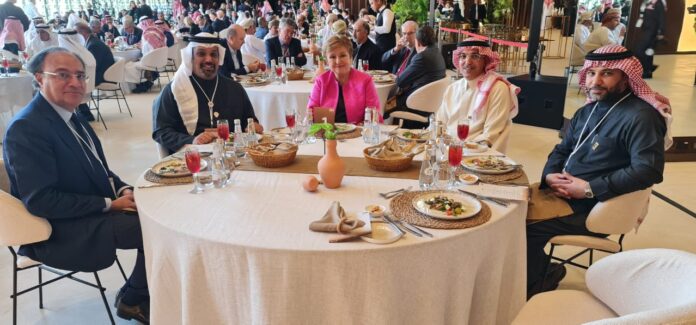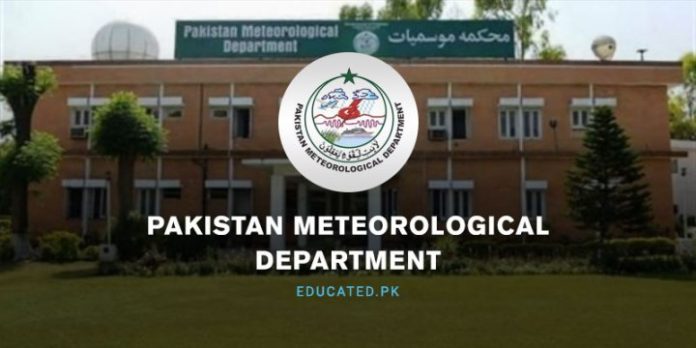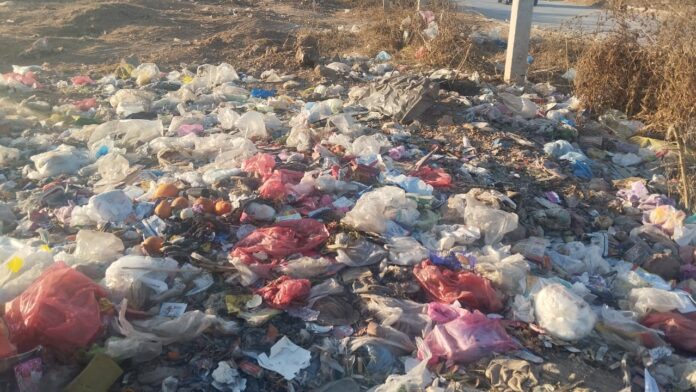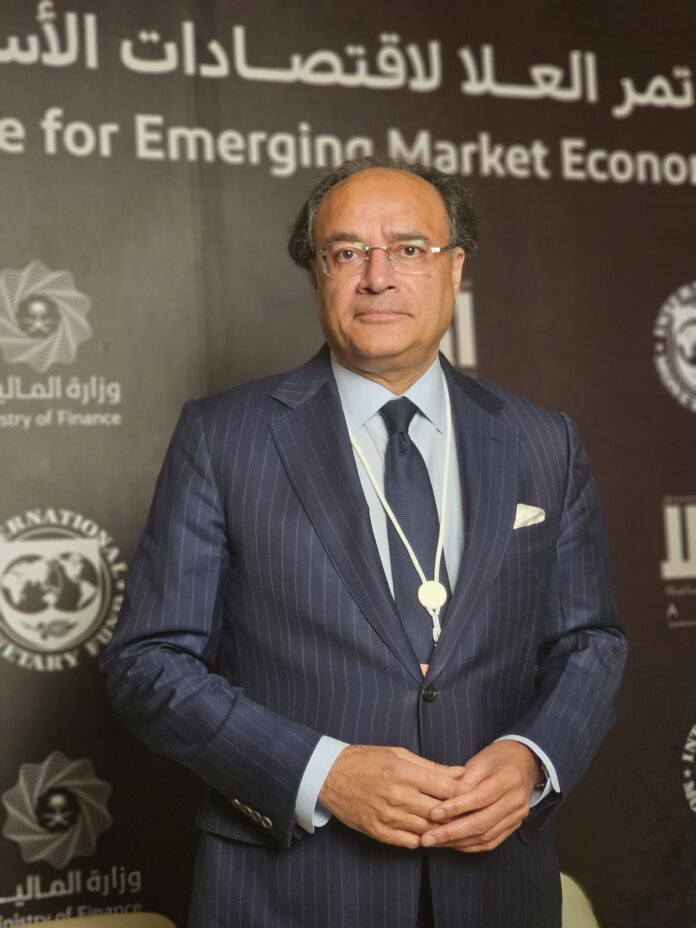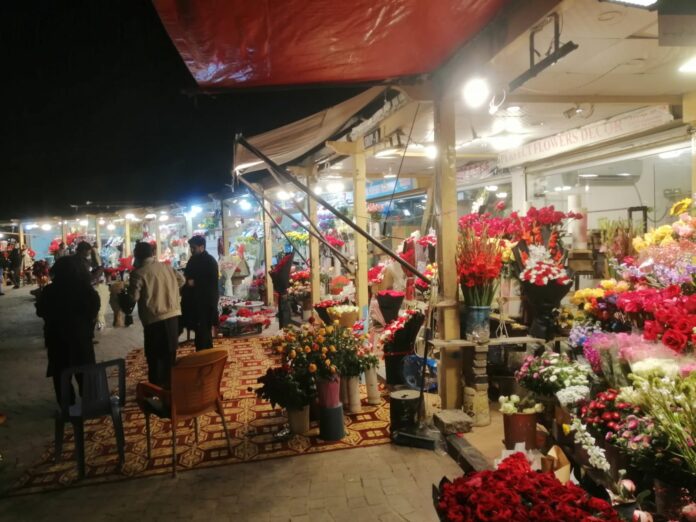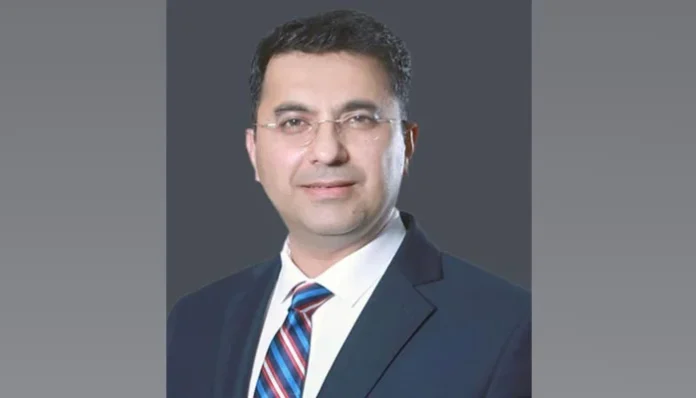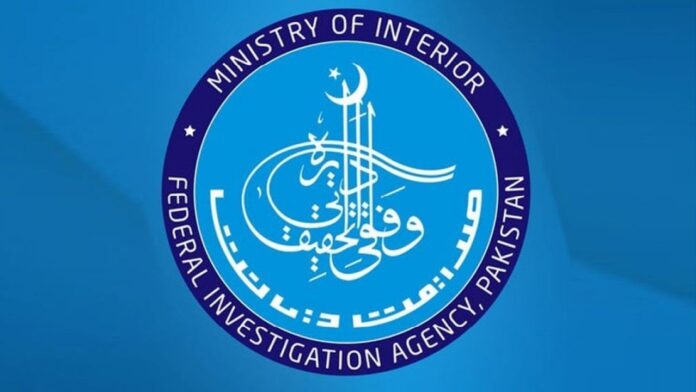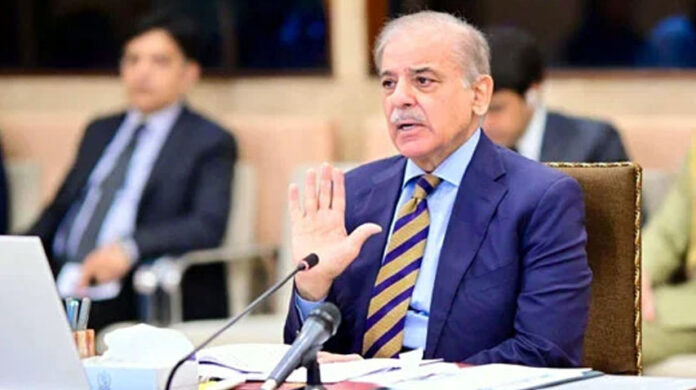DIG Islamabad emphasizes merit-based incentives, accountability
Malik for modernizing agriculture for sustainable economic growth
Islamabad Women Gala calls for stronger support for women entrepreneurs
ISLAMABAD, Feb 16 (APP): The two-day Islamabad Women Gala concluded on Sunday at Lok Virsa, bringing together over 120 women entrepreneurs from across Pakistan. Organized by Let’s Grow Together, the two-day event provided a platform for home-based businesswomen to showcase their products, connect with customers, and gain much-needed visibility in the market.
The gala featured a diverse range of locally made products, including handmade jewelry, textiles, organic skincare, artisanal foods, and home decor. Beyond a business exhibition, it served as a space for learning, networking, and community engagement, reinforcing the importance of supporting women-led businesses for sustainable economic growth.
The event’s slogan, “Buy from Your Own”, aimed to encourage consumers to support local entrepreneurs rather than relying on imported goods.
Visitors were keen to explore and purchase high-quality Pakistani products, while also engaging with the stories behind these businesses.
Sadia Malik, a visitor, sharing her experience said, “It’s refreshing to see so many women entrepreneurs being recognized. I bought some beautiful handmade jewelry and skincare products, and it feels great to support these hardworking women.”
The gala also offered a family-friendly environment, featuring a Food Arena with traditional and fusion cuisines, as well as interactive workshops and entertainment for children, she said.
Talking to APP, Ambreen Haider, Founder of Let’s Grow Together, emphasized the need for consistent business opportunities for women entrepreneurs and said, “These women are managing their businesses alongside household responsibilities, yet they lack proper platforms to grow. While events like this provide temporary exposure, they need a permanent space where they can sell their products regularly.”
She stressed that home-based entrepreneurs are contributing to both their families and the national economy, but without long-term support, their businesses struggle to sustain themselves.
On the topic of expanding globally, Haider pointed out that many of these businesses have the potential to succeed in international markets, but lack the training and digital access to do so.
“Right now, international trade is a challenge because even local market visibility is limited to a few events a year. If these women were trained to sell on platforms like Amazon, they could reach a much larger customer base,” she explained.
She urged the government and policymakers to ease business regulations, provide digital trade support, and create more opportunities for women entrepreneurs.
As the Islamabad Women Gala concluded, it left behind a strong message: women entrepreneurs are ready to grow, but they need sustained support to succeed.
The event was a step in the right direction, but the real impact will come when these businesses get continuous opportunities to thrive beyond temporary exhibitions.
‘Construction industry vital for economic growth’
Finance Minister joins high-level discussion at AlUla Conference
AlUla, SAUDI ARABIA , Feb 16 (APP): Federal Minister for Finance and Revenue Senator Muhammad Aurangzeb was invited to the head table luncheon by Saudi Arabia’s Finance Minister Mohammed Al-Jadaan during the Emerging Markets Conference-2025, which started here on Sunday.
The high-profile gathering included IMF Managing Director Kristalina Georgieva, Bahrain’s Finance and National Economy Minister, Shaikh Salman bin Khalifa Al Khalifa and Saudi Arabia’s Vice Minister of Finance Abdulmuhsen Alkhalaf, a news release said.
Aurangzeb’s participation underscores Pakistan’s proactive engagement in global economic policy-making and its commitment to fostering regional and international partnerships.
Dry weather forecast for Sindh
KARACHI, Feb 16 (APP): The Pakistan Meteorological Department on Sunday predicted dry weather in most parts of the Sindh province during the next 24 hours.
Mainly, dry weather is likely to prevail in the province.
Toxic flames: The hidden dangers of open waste burning in twin cities
By Samina Chaudhary
RAWALPINDI/ISLAMABAD, Feb 16 (APP):: Fatima, a mother from Rawalpindi’s Dhok Hassu, watches helplessly as her six-year-old son struggles to breathe, his chest heaving with each cough. Every morning, thick smoke from burning waste invades their home, worsening his chronic asthma.
“I wake up to this haze every day,” she says, her voice filled with helplessness. “My son’s condition worsens with every breath,” she shared with APP, deeply concerned.
For Fatima and countless others in Islamabad and Rawalpindi, the daily struggle is a fight for clean air and health. These cities, grappling with open waste burning, leave residents to bear the brunt of a persistent problem.
Fatima’s experience is common. In many low-income areas, poor waste management forces residents to burn trash to clear space or reduce pests.
Ahmed, a shopkeeper in Rawalpindi, has his own explanation and justification for the open waste burning, saying, “When garbage collectors don’t come for weeks, what else can we do?” .
Burning plastics, food scraps, and other waste materials releases a toxic mix of chemicals that harms both the environment and public health.
The pollutants from open burning are hazardous. Dr. Ejaz Ahmed, an environmentalist, warns that chemicals like dioxins, heavy metals, and fine particulate matter settle into our lungs, bloodstream, and even the food we consume. “The effects are devastating,” he says.
Pulmonologist Dr. Saira talking to APP highlighted the health crisis, particularly among children and the elderly. “Chronic exposure to polluted air is causing long-term lung damage and even lung cancer,” she says. Children, like Fatima’s son, are especially vulnerable, and many miss school due to illnesses. Parents struggle with expensive, ongoing treatments.
“The damage extends beyond human health. Green spaces in the twin cities are scarred by ash and toxic residues. Waste burning poisons the soil and water.Harmful chemicals are carried by rain into streams and underground water, disrupting ecosystems,”
explained Dr. Ejaz Ahmed, a well known environmantalist, in response to APP queries.
Local wildlife also suffers, with birds and pollinators like bees disappearing from urban parks, contributing to the loss of biodiversity.
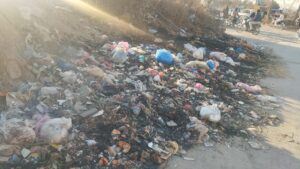
Amid this crisis, informal waste pickers play a crucial role. Gul Rahim, a waste picker in Islamabad, describes his dangerous work: “We do the work that no one else wants to do, yet we get no protection.” These workers, often from marginalized communities, sift through waste to recover recyclables without protective gear, putting their health at risk.
Open waste burning highlights weak policies and enforcement. Dr. Zeighum Abbas, Director of the Environmental Protection Agency, urges a holistic approach: “We need better waste segregation, collection, and recycling. Local governments must enforce penalties for burning, but also provide alternatives for disposal.”
Introducing controlled waste bins, more frequent garbage collection, and recycling incentives could help reduce burning, but these measures require strong enforcement and public cooperation.
Experts suggest several strategies to combat open waste burning, including encouraging waste segregation in households to separate recyclables, organic waste, and refuse; converting organic waste into nutrient-rich compost; setting up collection points and private recycling companies to alleviate landfill pressure; launching awareness campaigns and clean-up drives to shift public behavior; and enforcing stricter bans on open burning while ensuring waste management systems are functional.
Cities like Stockholm, Kigali, and Bengaluru have successfully reduced open waste burning by implementing robust policies. Islamabad and Rawalpindi have the potential to do the same with public support.
The air in Islamabad and Rawalpindi is thick with smoke, a daily reminder of the harm being done to the environment and public health. Families like Fatima’s are forced to live with polluted air and the threat of respiratory illness.
But it doesn’t have to be this way. The twin cities, once known for their greenery and fresh air, can reclaim their lost beauty. The choice is clear: continue suffering under pollution, or implement sustainable waste management practices for a cleaner, healthier future.
The time for action is now. Authorities, communities, and individuals must unite to demand cleaner air, safer waste disposal, and a better quality of life. Every fire lit today leaves behind a legacy of harm, one that future generations cannot afford to inherit.
ICT admin starts preparations for vibrant spring festival
ISLAMABAD, Feb 16 (APP): The district administration is all set to host a colorful spring festival, with preparations in full swing in the Federal Capital.
The district administration, led by Deputy Commissioner (DC) Islamabad Irfan Nawaz Memon, is ensuring that the event will be a memorable experience for all attendees, said the spokesman of ICT administration here.
The festival, scheduled for February 25, 26, and 27, aims to showcase Pakistan’s rich culture and provide entertainment for citizens and visitors alike.
In a recent review meeting chaired by DC Irfan Memon, the district administration discussed the final preparations for the Spring Festival.
The meeting saw participation from representatives of all relevant departments, including Additional Deputy Commissioners and Assistant Commissioners. The agenda focused on ensuring that every aspect of the event is meticulously planned and executed.
One of the key highlights of the meeting was the briefing on the arrangements for the main event. The officials confirmed that all details regarding food stalls have been finalized, ensuring a variety of culinary delights for attendees.
Additionally, the festival will feature participation from CEOs of international companies and members of the diplomatic community, adding a global touch to the celebrations.
DC Irfan Memon emphasized that the primary goal of the festival is to provide entertainment and recreational opportunities for the citizens.
He stated that the three-day event will be packed with activities designed to engage and delight attendees of all ages. The festival will also serve as a platform to highlight Pakistan’s cultural heritage, with various performances and exhibitions planned to showcase the country’s traditions and arts.
The Spring Festival is expected to draw large crowds, and the district administration is working tirelessly to ensure that all logistical and security arrangements are in place. The event promises to be a unique blend of cultural celebration and community engagement, offering something for everyone.
AlUla Conference for Emerging Market Economies starts; Aurangzeb represents Pakistan
AlUla, SAUDI ARABIA, Feb 16 (APP): The inaugural AlUla Conference for Emerging Market Economies commenced here on Sunday, bringing together finance ministers, central bank governors, policymakers and economic experts from around the world.
Pakistan’s Federal Minister for Finance and Revenue Senator Muhammad Aurangzeb, is attending the two-day high-level event on the special invitation of his Saudi counterpart, Mohammed Al-Jadaan, a news release said.
The conference, jointly organized by the International Monetary Fund (IMF) and the Saudi Ministry of Finance, aims to foster discussions on building resilience and sustainable economic growth amid global economic uncertainties.
A total of nine sessions will take place, featuring 200 participants and 36 speakers, with representatives from 48 countries in attendance.
During the conference, Senator Aurangzeb will take part in a high-level panel discussion on “Navigating the Path for Resilient Emerging Markets” moderated by IMF Managing Director Kristalina Georgieva, alongside finance ministers from Egypt, Brazil,and Türkiye.
The AlUla Conference is set to become an annual platform for emerging markets and developing economies to shape global economic discourse, enhance policy coordination, and strengthen international cooperation for sustainable economic stability.
Petals of Profit: Islamabad’s flower sellers bloom on special days
ISLAMABAD, Feb 16 (APP):: In every bloom, there’s a story of love, joy, and special moments. The world of flower sellers is one where fragrance meets emotions, where each petal sold carries the essence of love, affection, and celebration. As important days like Valentine’s Day, Mother’s Day, and weddings bring flurries of activity, these sellers watch their businesses blossom. Their days are filled with the sweet smell of blooms, but behind the petals lies a deeper connection to the joy of giving and receiving.
Kashif, a florist at Super Market Islamabad talking to APP, was amazed by the overwhelming demand. “On regular days, we sell around 400 to 500 flowers, but during occasions like Valentine’s Day, that number skyrockets to 15,000 to 16,000 per vendor,” he said. Super Market and F-6 Market are the most popular spots for floral shoppers.
Islamabad’s flower markets were packed with a wide variety of blooms, from red and yellow roses to tulips, lilies, gladiolus, and the delicate white gypsophila, often used in decorations.
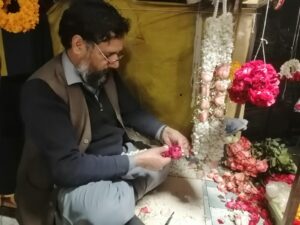
New trends have emerged alongside traditional bouquets. Florist Mudassir observed that customers now prefer more elaborate arrangements, incorporating ribbons, chocolates, and heart-shaped balloons. “A bouquet is no longer just a gift; it’s a thoughtful expression of love,” he explained.
The markets in Islamabad were filled with a stunning variety of flowers—roses, tulips, lilies, gladiolus, and gypsophila, also known as “baby’s breath.”
These flowers primarily come from Pattoki, Pakistan’s ‘City of Flowers.’ Kashif shared, “Most of the flowers sold here come from Sahiwal, Arifwala, and Pattoki. Bulk orders are placed, and the flowers are carefully packed for delivery. ‘Cut flowers,’ prized for their long stems and elegance, are especially in demand.”
The excitement of Valentine’s Day was not confined to the markets. Even street corners and traffic signals became makeshift floral stalls. Vendors, including children, sold garlands and single-stem roses. Mehboob, a garland seller, revealed that he sold over 1,000 garlands on Valentine’s Day, a huge jump from the usual 50 to 100 per day.
Sultana, a local shopper, said, “On Eid, we expect clothes or jewelry, but on Valentine’s Day, our hearts yearn for flowers.” Another woman, Nadia in her remarks about the timeless appeal of flowers shared with APP, said, “Flowers have always been a symbol of love for me. Even now, when my husband or children gift me flowers, it brings so much joy to my heart.”

Even children embraced the spirit of love. A 12-year-old boy, Dawood, holding a small bouquet, smiled and said, “My mother is my first love, and I’m spending my pocket money to buy these flowers for her.”
Professionals and government employees also joined in the Valentine’s Day celebration. Muhammad Tahir, a government worker, proudly carried a bouquet for his wife. “She is the light of my life and the mother of my children. This is a small gesture to show my appreciation,” he said.
With the surge in demand came higher prices. A single red rose with a six-inch stem was priced between Rs100 and Rs150, while a bouquet of red roses cost anywhere from Rs500 to Rs700. Artificial flowers ranged from Rs70 to Rs120 each, and Valentine’s-themed teddy bears, heart-shaped cushions, and gas-filled balloons ranged from Rs300 to Rs2,500.
According to the Ali Flower Market, the past two days saw record-breaking sales of red roses and rose petals, with petals alone selling for Rs500 per kilogram.
Several other global occasions also bring joy and flowers into many hands. Mother’s Day, with its focus on honoring maternal love, is a key time for florists. Weddings, anniversaries, and engagements also see flowers symbolizing love and new beginnings. Other celebrations like Christmas, New Year’s, and birthdays feature floral arrangements that add warmth and cheer, making flowers a timeless gift for nearly every occasion.
The economic impact of these occasions is significant. With thousands of flowers sold, along with increased demand for items like teddy bears, chocolates, and balloons, the floral industry generates billions of rupees during events like Valentine’s Day. From farmers to vendors and supporting businesses, these celebrations fuel the local economy. Flower sellers not only spread love but also drive economic growth, turning petals into prosperity.
PIDE VC calls for decisive action to integrate renewable energy with carbon-credit markets
ISLAMABAD, Feb 16 (APP): Newly appointed Pakistan Institute of Development Economics (PIDE) Vice Chancellor Dr Nadeem Javaid, while sharing his vision to position climate finance as both an environmental necessity and an economic imperative, on Sunday called for immediate and decisive action to integrate renewable energy with carbon credit markets.
“Climate change is no longer a distant threat but a present reality. The recent climate-induced disasters in Pakistan highlight the direct link between environmental security and economic resilience. We must adopt bold policies and strategic investments to harness our vast renewable energy potential,” he said, according to a PIDE news release.
He said Pakistan stood at a pivotal moment in its fight against climate change, with an opportunity to transform its renewable energy sector into a revenue-generating powerhouse.
In line with this vision, PIDE has released a groundbreaking knowledge brief, “Unlocking Climate Finance: Potential Carbon Credits from Renewable Energy,” authored by Muhammad Faisal Ali, Research Fellow at PIDE, and Usama Abdul Rauf, Research Associate at RASTA.
The brief highlights how Pakistan can generate revenue while combating climate change by tapping into global carbon credit markets.
At COP-29, developed nations pledged to increase climate finance to USD 300 billion annually, yet this still falls USD 1 trillion short of what is needed. This financing gap has amplified the significance of carbon markets—a mechanism where corporations and countries offset their emissions by purchasing credits from nations investing in green projects.
Pakistan, with its abundant solar and wind resources, has yet to fully capitalize on this opportunity. Despite policy guidelines for carbon trading, only 4.58% of Pakistan’s electricity currently comes from renewables—a stark contrast to the country’s untapped potential.
According to the knowledge brief, Pakistan’s solar energy potential exceeds 100,000 MW annually, particularly in the Sunny Belt regions. Expanding renewable energy and net metering could not only reduce reliance on imported energy but also unlock millions of dollars in carbon credit revenues.
“Consumers in Pakistan already export approximately 481,863 MWh of solar electricity to the national grid. Given an emission rate of 1 ton of CO2 per MWh, this equates to 475,840 tons of CO2 avoided annually—a potential revenue of USD 6.1 million at a conservative carbon price of USD 12.90 per ton,” it added.
Future projections suggested that expanding off-grid renewable energy could increase earnings to between USD 21.5 million and USD 43 million, depending on market pricing mechanisms. With scaled-up investments, these figures could grow exponentially.
The knowledge brief urged policymakers, investors and energy stakeholders to accelerate renewable energy adoption to maximize carbon credit revenues, strengthen carbon credit verification systems to meet international standards, and align with global carbon trading frameworks to secure Pakistan’s position in the international carbon market.
“With the right policies, Pakistan can transform its energy landscape, attract climate finance, and ensure long-term economic resilience,” it added.
In line with vision of the VC, PIDE said it remained committed to providing data-driven policy solutions that aligned with sustainable development goals and secured Pakistan’s energy future.
One held for Illegal currency exchange
Hypertension identified as most prevalent non-communicable disease in KPK
ICC CT additional tickets for UAE matches to go on sale Sunday
Govt plays vital role in fostering business, employment opportunities
PM strongly condemns terrorist attack on Kalat Levies check post
ISLAMABAD, Feb 16 (APP): Prime Minister Muhammad Shehbaz Sharif on Sunday strongly condemned a terrorist attack on Levies check post in Kalat, Balochistan.
The prime minster prayed for the high ranks of shaheed personnel and for the bereaved family to bear the loss with fortitude, PM Office Media Wing said in a press release.
The prime minister also paid tribute to martyred personnel Ali Nawaz and prayed for the early recovery of the injured.
He said the terrorists were the enemies of the development and progress of Balochistan province and reiterated that terrorists’ nefarious designs would not be allowed to succeed.
The Levies personnel had laid down his life for the defence of the country, he said and saluted the martyred personnel for sacrificing his life for the sake of peace in the country.





